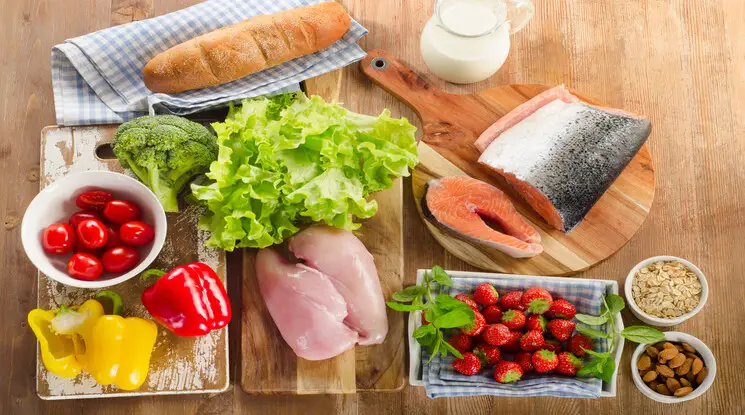In a world filled with fast food and convenience meals, maintaining a balanced and nutritious diet can be a challenge. However, making mindful choices about what we eat is crucial for our overall well-being. In this blog, we’ll explore healthy eating tips and share delicious recipes that not only tantalize your taste buds but also contribute to a balanced and wholesome diet.
-
The Foundation of a Balanced Diet:
A balanced diet is the cornerstone of good health. It provides the necessary nutrients, vitamins, and minerals our bodies need to function optimally. To achieve this balance, it’s essential to include a variety of foods from different food groups in your daily meals. Here’s a breakdown of the key components:
- Fruits and Vegetables: Aim to fill half your plate with a colorful array of fruits and vegetables. They are rich in fiber, vitamins, and antioxidants, promoting digestive health and bolstering your immune system.
- Lean Proteins: Incorporate lean protein sources like poultry, fish, beans, and legumes into your meals. Protein is crucial for muscle repair, and it helps keep you feeling full for longer periods.
- Whole Grains: Choose whole grains such as brown rice, quinoa, and whole wheat bread over refined grains. Whole grains provide sustained energy, fiber, and essential nutrients.
- Healthy Fats: Include sources of healthy fats like avocados, nuts, and olive oil in your diet. These fats support heart health and aid in the absorption of fat-soluble vitamins.
- Dairy or Dairy Alternatives: Ensure adequate intake of calcium and vitamin D by including dairy products or fortified alternatives in your diet.
-
Nutritious Recipes for Every Meal:
a. Breakfast Boost: Quinoa and Berry Breakfast Bowl
Start your day with a nutrient-packed breakfast. Cooked quinoa topped with a mix of fresh berries, a drizzle of honey, and a sprinkle of chia seeds creates a delicious and satisfying breakfast bowl. Quinoa offers protein and fiber, while berries provide a burst of antioxidants.
b. Lunchtime Power Salad: Grilled Chicken and Avocado Salad
For a vibrant and filling lunch, prepare a grilled chicken and avocado salad. Load up on leafy greens, cherry tomatoes, cucumber, and grilled chicken breast. The avocado adds creaminess and heart-healthy monounsaturated fats.
c. Dinner Delight: Baked Salmon with Quinoa and Roasted Vegetables
Incorporate omega-3 fatty acids into your dinner with baked salmon. Serve it alongside a bed of cooked quinoa and a medley of roasted vegetables like sweet potatoes, broccoli, and bell peppers. This meal is rich in protein, healthy fats, and essential nutrients.
d. Snack Smart: Greek Yogurt Parfait
Create a satisfying and nutritious snack by layering Greek yogurt with fresh fruit, granola, and a drizzle of honey. Greek yogurt is high in protein and probiotics, supporting gut health, while the fruit and granola provide a delightful crunch and natural sweetness.
-
Health Benefits of Key Foods:
a. Berries:
Berries, such as blueberries, strawberries, and raspberries, are packed with antioxidants that help combat oxidative stress in the body. They are also rich in vitamins and fiber, promoting heart health and aiding in digestion.
b. Salmon:
Salmon is a fatty fish loaded with omega-3 fatty acids. These essential fats contribute to heart health, reduce inflammation, and support brain function. Including salmon in your diet can also improve cholesterol levels.
c. Quinoa:
Quinoa is a versatile grain that is a complete protein source, meaning it contains all nine essential amino acids. It’s an excellent choice for vegetarians and vegans and provides a good dose of fiber, iron, and magnesium.
d. Avocado:
Avocados are rich in monounsaturated fats, which are heart-healthy fats. They also contain potassium, vitamin K, and folate. Including avocados in your diet can contribute to lower cholesterol levels and overall cardiovascular health.
e. Greek Yogurt:
Greek yogurt is a protein powerhouse and a probiotic-rich food that supports gut health. It also provides calcium for strong bones and muscles.
-
Conclusion:
In conclusion, adopting a healthy and balanced diet is not about deprivation but about making informed choices that benefit your body and mind. By incorporating a variety of nutrient-dense foods and trying out the delicious recipes provided, you can embark on a journey toward better health. Remember, small changes in your eating habits can lead to significant improvements in your overall well-being. So, savor the flavors of nutritious meals and nourish your body for a vibrant and fulfilling life.










